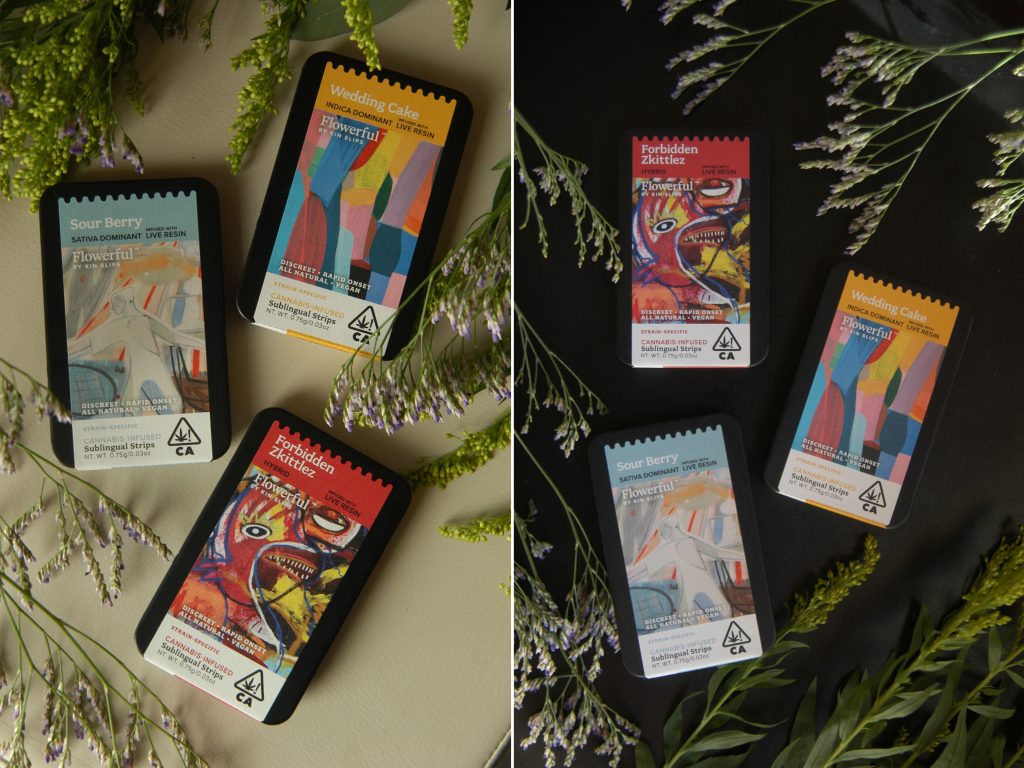Kin Slips Bridges Medicinal + Recreational Cannabis Use as it Perfects Sublingual Delivery
Creating products made for pain-relief and fun, this company also donates their cannabinoid-infused strips to those who need them most

Alongside the crowd of rapidly evolving cannabis companies, Kin Slips stands in a lane of their own. The California-based brand’s cannabinoid- and terpene-infused sublingual strips dissolve under the tongue after interacting with saliva in the mouth, bypassing enzymes and acids from the digestive tract and releasing active ingredients directly into the bloodstream. This streamlined delivery method offers a fast-acting and undiluted product that Kin Slips has innovated to create one of the most efficient and reliable way to consume cannabis.

This reliability has had lasting, impactful effects in the medical marijuana space, as many elderly patients or patients dealing with chronic illness have turned to sublingual cannabinoid slips in order to best manage pain. Unlike other cannabis companies that cater most dominantly to recreational use, Kin Slips provides a pain-relief product for many in the marijuana community who have gone overlooked. On the recreational side, Kin Slips also offers dependable and high-quality highs, especially for those on the go or in an environment where smoking is prohibited.
Their latest line and the world’s first single-strain sublingual slip, Flowerful, exemplifies the company’s creativity in cannabis while paying homage to the purity of strains and plants. The limited edition collection is sourced from family farms in Southern California, where each strain is paired with a local artist’s illustration that captures the spirit of the profile. Wedding Cake, for instance, comprises relaxing terpenes paired with the painter Poppy Dodge’s cathartic and abstract use of color.

Supporting the California community is paramount to the brand’s ethos; they partner with local organizations like Sweetleaf Collective, Last Prisoner Project and Floret Coalition to donate over 65,000 of their sublingual strips to those with longterm ailments, people with HIV/AIDS, veterans and people who can’t afford medicinal cannabis. We spoke with Kin Slips’ Chief Product Officer and Chief Executive Officer, Josh Kirby and Andrew Lobo, about the beauty in sublingual, their community-oriented practice and what medical innovations look like for the cannabis industry.

Why sublingual? What benefits do they offer that traditional ingestion or smoking don’t?
Josh Kirby: Underneath your tongue there’s this membrane called oral mucosa. That membrane is really porous. You can think about it kind of like a sponge; it’s got a bunch of little holes in it that allow us to accept compounds easier than other places in the body. When you utilize a sublingual strip, you can take this active ingredient and put it directly through that membrane, directly into your bloodstream. The main benefit is that you have a shorter on set time. When you eat something, it has to go through your entire digestive system. That process normally takes, on the short side, 40 minutes. With sublingual, you should feel the effects in about 10 minutes.
Another big advantage is that you have a much more predictable experience because you’re receiving a more predictable amount of the product activate in your bloodstream. Ultimately, that results in sublingual providing a more pure experience and a more predictable experience in a faster time. The problem that we are trying to solve with Kin Slips is providing people a fast-acting solution that they don’t have to smoke but works the same way.

How are the strips made?
JK: The first step is to take the natural, plant-based ingredients that go into the strip and combine them together in a really specific order, using a specialized mixer called a homogenizer, which is basically an intense blender that makes things particle size. Then, you end up with what looks like a huge bucket full of smoothie. That part’s called a slurry. That slurry is then pumped into a machine that spreads the slurry out in a very precise thinness to a substrate which we roll into a giant roll and then cut into 50,000 small rolls. That’s really kind of our sweet spot for making sure batch quality is really high, while being able to produce enough where the waste that goes with the process is shrunk.

Can you talk about your community work? What type of work is it and how did you discern between partnerships?
Andrew Lobo: We spent time learning about the organizations, did our diligence, understood who would best benefit from donations of our sublingual product. We’re a donor monetarily, as well as in product, to events and causes related to the Last Prisoner Project. We acknowledge that the industry has social equity issues. There are people who are wrongfully imprisoned and wrongfully lost their lives because of cannabis-related issues, so that’s a cause we strongly support. We’re also an AAPI business and we are supporters of many AAPI issues, particularly in 2020 as many issues arose. Also, we’re a sponsor of The Floret Coalition which seeks to support Black, Latinx and Indigenous charities.
I wouldn’t say there’s a standard partnership process, but it’s more about figuring out if it’s actually going to be impactful rather than just being a headline.

Technology is an integral part of the company, too. How do you envision this within the industry?
JK: A lot of what you see in the cannabis space right now that’s being promoted as new technology—that’s all coming from other industries that have been working on this stuff forever, like extraction technologies which have been used by the hops industry for 40 to 50 years. As the cannabis industry matures, we’re starting to get to the point where we can adopt a lot of these technologies from other industries. A lot of what Kin Slips is doing is looking around at other industries and seeing what really works. What are other industries implementing to solve problem for their market? That was how we arrived at the strip in the first place. Everybody complains that edibles take too long and they make you freak out and they’re super-inconsistent. What options do we have that nobody else is really trying to popularize that we could look at and bring over to the cannabis space? Strips make a lot of sense because they solve all those problems.
Not in the US, but in the rest of the world, the most popular way to be admitted medication like Viagra is actually through sublingual strips. So it was really a process of us looking and seeing what what was working and figuring out how to make it happen for cannabis.

In regard to the pharmaceutical industry, how does Kin Slips fill a gap in the medical marijuana market? What does this gap look like?
JK: The financial incentives to make products for the adult-use market is much higher in a much bigger market than the medical market, which is really small. The focus on developing products has been for that bigger market, pulling attention away from the medicinal side. That side is looking for really specific cannabinoid formulations to treat a really big thing, or a broader cannabinoid formulation to treat something less specific, but they need to deliver that in a way that is usually smoke-free, fast-acting and predictable, because obviously when treating something you want to have a reliable source of relief. And that’s where we see our ability to walk the line between medicinal cannabis use and adult use.
The real benefits to Kin Slips is we’ve created this really unique and really powerful delivery system, and as we learn more about which cannabinoids and which terpenes and which combinations of the two treat certain things, we can take that research as that opens up and put it right into our product. We can put it into our system and have that as a solution, and I think that’s how we’re going to help a lot of patients and also a lot of people who are looking for adult use, wellness or something in-between.
All images courtesy of Kin Slips












